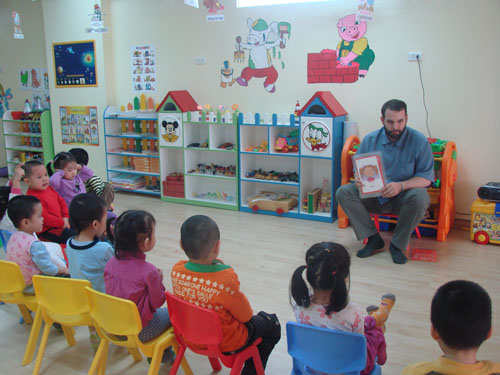Recently (September 08, 2020), the Ministry of Education and Training (MOET) organized a consultation to finalize the Draft Circular on the Program for Familiarizing Preschool Children with English. According to the plan, the English teaching program for preschool children is expected to be implemented starting from 2020.

Implement English language teaching program for preschoolers from 2020 (expected) (Illustration)
To be specific, in order to meet the needs of parents and the abilities of children in becoming familiar with English in preschool institutions that meet necessary conditions, the Ministry of Education and Training has drafted the Circular on the English Familiarization Program for Preschool Children. The program helps children experience and enjoy learning English; aims at forming and developing English communication skills; prepares them well for learning English in primary school; and creates opportunities for children to get acquainted with different cultures.
The English teaching program for preschool children is built on the educational perspective of "child-centered approach" with the following educational content:
Regarding language skills
- Listening skills:
- Listening to very simple, simple, and familiar words denoting people, names of objects, phenomena, and actions: listening within the range of about 35 words and phrases (for ages 3-4); listening within the range of about 70 words and phrases (for ages 4-5); listening within the range of about 100 words and phrases (for ages 5-6);- Listening to numbers from 1 to 10;- Following very simple, simple, and familiar instructions;- Responding non-verbally or verbally in very simple, simple, and familiar communication situations appropriate to their age;- Responding non-verbally or verbally (using 1 to 3 words) when participating in age-appropriate games;- Listening to very simple rhymes, poems, songs, and picture stories appropriate to their age.
- Speaking skills:
- Repeating and saying words denoting people, names of objects, phenomena, and actions that are very simple, simple, and familiar to their age;- Pronouncing words, phrases, and sentences clearly within the familiar vocabulary range;- Responding with gestures, actions, or answering with 1-3 words, phrases, simple sentences in very simple, simple, familiar communication situations;- Responding with gestures, actions, or speech when participating in age-appropriate games;- Repeating and singing very simple rhymes, poems, and songs appropriate to their age;- Answering and retelling parts of stories, narrating stories using pictures.
- Getting familiar with reading:
- Viewing illustrations and reading aloud words denoting people, identifying names of objects, phenomena, and actions within the familiar vocabulary range;- Getting familiar with some symbols and signs (possibly including some letters and words) that are very simple and familiar to their age;- Viewing pictures, comic strips, and reading based on the pictures.
- Getting familiar with writing: Coloring symbols and English letters.
Regarding language knowledge
- Vocabulary: About 100 words and phrases for people, objects, phenomena, particularly simple actions familiar to their age.- Sentence structures: Some very simple and familiar communicative sentence structures in specific communication situations appropriate to their age (greeting sentences, requests, questions, exclamatory sentences, statements).
Therefore, depending on actual implementation conditions, needs, and the abilities of the children, preschool educational institutions should develop detailed plans and organize activities flexibly, ensuring the purpose and requirements of familiarizing children with English. The process of familiarizing preschoolers with English involves 35 weeks/year, with a minimum of 02 English familiarization activities/week, each activity lasting from 25 to 35 minutes.
Currently, the Ministry of Education and Training only allows the English learning program as an elective subject for students in grades 1 and 2, and as a compulsory foreign language program from grade 3 onwards. However, for preschool children, the Ministry has not yet permitted it. Nevertheless, numerous private preschools have already incorporated English teaching programs into their curriculum with bilingual school models and international schools, earning a significant number of enrollments from parents despite the high tuition fees.
Therefore, towards the goal of forming and developing English communication skills based on the needs and abilities of children and better preparing them for learning English in primary school, the Ministry of Education and Training has drafted the English Familiarization Program for preschool children and officially permits English teaching in preschools as an elective subject if this Draft Circular is approved.
Ty Na
 Article table of contents
Article table of contents








